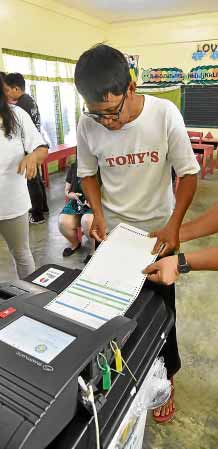
MOCK A voter uses a machine during mock elections held by the Commission on Elections in Dagupan City on Jan. 19. —RAY B. ZAMBRANO
The Commission on Elections (Comelec) on Tuesday urged rival candidates in the May 13 midterm polls to be on guard against one another for vote-buying.
“Watch out against each other,” said Comelec Commissioner Rowena Guanzon in a radio interview.
“If your rival is engaged in such activities, then file the necessary charges,” she said.
Vote-buying is a major election offense, which carries the penalty of one to six years imprisonment, removal of right to vote and disqualification from holding public office.
Guanzon issued the statement as she expressed belief that curbing vote-buying could be a better way to prevent narcopoliticians from getting elected instead of making public the names of these candidates.
“If the main concern is drug money circulating this elections, then let us stop vote-buying,” she said.
“Drug lords and politicians, when they do vote-buying, let us charge them,” Guanzon said.
She said this was especially true at the local level, where vote-buying remained prevalent.
“At the local level, people there really sell their votes,” Guanzon said.
She earlier said that releasing the so-called narcolist would be unfair since the involvement in drugs of those on the list had not yet been affirmed by the courts.
Guanzon said that such a move would just be tantamount to “negative campaigning” which she believed would be unfair to candidates.
Earlier, the Department of the Interior and Local Government (DILG) announced its plan to release the narcolist ahead of the elections.
The DILG announcement was apparently in response to a statement made by President Duterte that he was concerned about drug money coming into play in the elections.
Comelec spokesperson James Jimenez, in a press briefing on Monday, said negative campaigning was not illegal, however.
e said, though, that negative campaigning bordering on libel would be unlawful.